- Other Names
- B cell growth factor 1 (BCGF-1), B-cell stimulatory factor 1 (BSF-1), interleukin-4, lymphocyte stimulatory factor 1, MGC79402
- Ave. Rating
- Submit a Review
- Product Citations
- publications
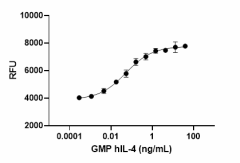
-

GMP recombinant human IL-4 induces proliferation of TF-1 erythroleukemic cells in a dose-dependent manner with an ED50 range of 0.04 - 0.2 ng/mL.
| Cat # | Size | Price | Save |
|---|---|---|---|
| 574014 | 25 µg | ¥96,800 | |
| 574016 | 100 µg | ¥333,960 |
IL-4 is the primary cytokine implicated in the development of Th2-mediated responses, which is associated with allergy and asthma. The Type I receptor comprises IL-4Rα and the common gamma-chain (γc), which is also shared by the cytokines IL-2, -7, -9, -15 and -21 and is present in hematopoietic cells. IL-4 can use the type II complex, comprising IL-4Rα and IL-13Rα1, which is present in non-hematopoietic cells. This second receptor complex is a functional receptor for IL-13, which shares approximately 25% homology with IL-4. The type I receptor complex can be formed only by IL-4 and is active in Th2 development. In contrast, the type II receptor complex formed by either IL-4 or IL-13 is more active during airway hypersensitivity and mucus secretion and is not found in T cells.
Product DetailsBioLegend Cell-Vive™ GMP Recombinant proteins are manufactured and tested in accordance with USP Chapter 1043, Ancillary Materials for Cell, Gene and Tissue-Engineered Products and Ph. Eur. Chapter 5.2.12 in a dedicated GMP facility compliant with ISO 13485:2016. Specifications and processes include:
- Low endotoxin level (≤ 0.1 EU/μg)
- Purity (≥ 95% or higher)
- Bioburden testing
- Mycoplasma testing
- Batch-to-batch consistency
- Vendor qualification
- Raw material traceability and documentation
- Documented procedures and employee training
- Equipment maintenance and monitoring records
- Lot-specific certificates of analysis
- Quality audits per ISO 13485:2016
- QA review of released products
Product Details
- Source
- Human IL-4, amino acids His25-Ser153 (Accession# NM_000589) was expressed in E. coli.
- Molecular Mass
- The 130 amino acid recombinant protein has a predicted molecular mass of approximately 15.1 kD. The N-terminal amino acid is Met.
-
N-terminal
Sequence Analysis - Met-His-Lys-(Cys)-Asp-Ile-Thr-Leu-Gln-Glu
- Purity
- ≥ 95%, as determined by Coomassie stained SDS-PAGE
- Formulation
- 0.1 µm filtered protein solution is in PBS, pH 7.2.
- Endotoxin Level
- Less than or equal to 0.1 EU per µg protein as determined by the LAL method
- Residual Host Cell Protein Content
- ≤ 0.500 ng/μg by ELISA
- Concentration
- 500 µg/mL
- Storage & Handling
- Unopened vial can be stored between 2°C and 8°C for up to 2 weeks, at -20°C for up to six months, or at -70°C or colder until the expiration date. For maximum results, quick spin vial prior to opening. The protein can be aliquoted and stored at -20°C or colder. Stock solutions can also be prepared at 50 - 100 µg/mL in appropriate sterile buffer, carrier protein such as 0.2 - 1% endotoxin-free BSA or HSA can be added when preparing the stock solution. Aliquots can be stored between 2°C and 8°C for up to one week or stored at -20°C or colder for up to 3 months. Avoid repeated freeze/thaw cycles.
- Activity
- ED50 = 0.04 - 0.2 ng/mL, as determined by a dose-dependent stimulation in a proliferation assay with TF-1 erythroleukemic cells. Deep Blue Cell Viability™ Kit (Cat. No. 424701) is used to measure the proliferation. The specific activity of Cell-Vive™ GMP Recombinant Human IL-4 (carrier-free) is >7.7 x 107 IU/mg when compared against the WHO International Standard for Human IL-4 (NIBSC code: 88/656).
- Application
-
Bioassay
Cell Culture - Application Notes
-
BioLegend carrier-free recombinant proteins provided in liquid format are shipped on blue ice. Our comparison testing data indicates that when handled and stored as recommended, the liquid format has equal stability and shelf-life compared to commercially available lyophilized proteins after reconstitution. Our liquid proteins are verified in-house to maintain activity after shipping on blue ice and are backed by our 100% satisfaction guarantee. If you have any concerns, contact us at tech@biolegend.com.
- Product Citations
-
- Disclaimer
-
BioLegend Cell-Vive™ GMP Recombinant proteins are for research use only. Suitable for ex vivo cell processing. Not for injection or diagnostic or therapeutic use. Not for resale. BioLegend will not be held responsible for patent infringement or other violations that may occur with the use of our products.
Antigen Details
- Distribution
-
IL-4 is produced by Th2 cells, naive CD4+ T cells, NKT cells, and basophils.
- Function
- IL-4 has a crucial role in the differentiation of TH2 cells and induction of Th2 associated cytokines. IL-4, through its activation of STAT6, upregulates GATA3 expression and also suppresses TH1 and TH17 cell responses, partly through the upregulation of growth factor independent 1(GFI1), a transcriptional repressor of IFN&gammal and IL-17 production. IL-4 induces macrophage activation and TSLP production. IL-4 recruits and activates IgE-producing B cells (IgE class switching) and enhances IgE-mediated responses by up-regulating IgE receptors on B lymphocytes, mast cells, and basophils. In addition, IL-4 also induces VCAM-1 on vascular endothelium and thus directs the migration of T lymphocytes, monocytes, basophils, and eosinophils to the inflammation site.
- Interaction
- T cells, B cells, macrophages, epithelial cells, smooth muscle cells, and bronchial fibroblasts
- Ligand/Receptor
- IL-4 signals through Type I (IL-4Rα, γc) and Type II receptors (IL-4Rα, IL-13Rα1) complexes.
- Bioactivity
- Measured by its ability to induce proliferation of TF-1 erythroleukemic cell
- Cell Type
- Embryonic Stem Cells, Langerhans cells
- Biology Area
- Cell Biology, Immunology, Stem Cells
- Molecular Family
- Cytokines/Chemokines
- Antigen References
-
- Swain SL, et al. 1990. J. Immunol. 145:3796.
- Hsieh CS, et al. 1992. P. Natl. Acad. Sci. USA 89:6065.
- Allison-Lynn A, et al. 2006. J. Immunol. 176:7456.
- Kato A, et al. 2007. J. Immunol. 179:1080.
- LaPorte SL, et al. 2008. Cell 132:259.
- Martinez FO, et al. 2009. Annu. Rev. Immunol. 27:451.
- Gene ID
- 3565 View all products for this Gene ID
- UniProt
- View information about IL-4 on UniProt.org












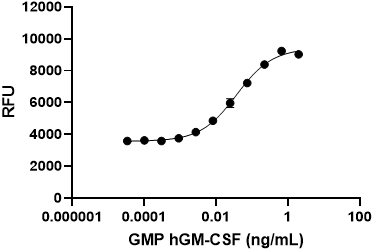
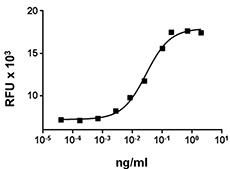
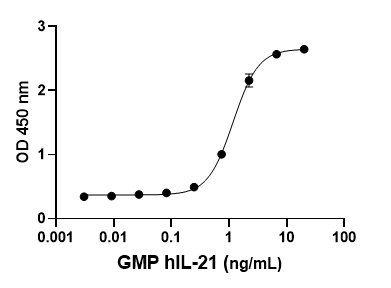
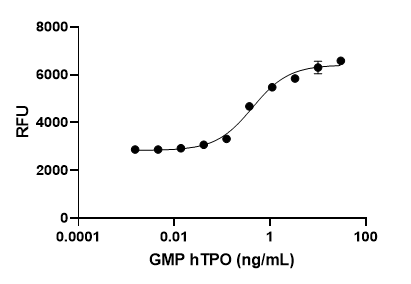



Follow Us